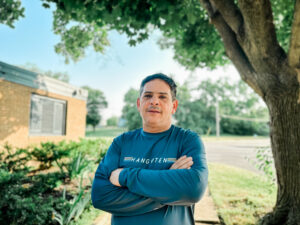David Maldonado, who works both as a pastor of College Mennonite Church and a construction worker, shares what life in bivocational ministry is like and why someone might choose that path in an interview with Adriana Celis of MenoTicias.
This blog has been translated from Spanish. See the original Spanish article in MenoTicias. Lea la versión en español aquí.
 Adriana Celis writes for MenoTicias, the Spanish-language digital newsletter of MC USA and Hispanic Ministries of Mennonite Education Agency. She lives in Colombia and is pursuing a degree in law.
Adriana Celis writes for MenoTicias, the Spanish-language digital newsletter of MC USA and Hispanic Ministries of Mennonite Education Agency. She lives in Colombia and is pursuing a degree in law.
______________________________________
Bivocational ministry is loved by many and hated by others. Therefore, we should address this reality, especially since Latin American pastors, or those of Latinx origin who live in the United States, often find themselves experiencing these “two worlds,” and balancing their service to the church with their secular jobs.
So what does it mean to be a bivocational pastor? And why do some people think of it unfavorably? Why does bivocational service still generate controversy?
A bivocational call
The MenoTicias staff decided to delve into the subject, so Adriana Celis spoke with David Maldonado, who has spent more than 30 years dedicating himself to being a bivocational pastor. Maldonado was born in New York City. His parents were born in Puerto Rico and immigrated to the United States with hopes of forging a better future for themselves and their children.
Maldonado describes himself as an enterprising, cheerful, outgoing visionary, who is easy to get along with and approach, and who is of firm convictions about his faith in Jesus Christ. He is married to Madeline Maldonado and is the father of five children and grandfather of 15 grandchildren. He was senior pastor of the Ark of Salvation Mennonite Church in Fort Myers, Florida, for 27 years. For the past five years, he has served on the pastoral team of the College Mennonite Church in Goshen, Indiana, as the community outreach pastor.
Cristian Alemán, who is the outreach coordinator and director of bilingual music and praise at College Mennonite Church and one of Maldonado’s closest friends, defines him as “a loyal man, a good friend and a wise man who shows himself as he is and how he is, both in the pulpit and in his private life. David is a man who lives what he preaches and who has a big heart, moved by mercy.”
His daughter, Alicia Maldonado-Zahra, describes him as follows: “Proverbs 17:22 affirms that ‘a cheerful heart is good medicine,’ and this reminds me of my dad. He has taught my brothers, cousins and me to lead our lives with joy, even in the midst of wonderful and difficult moments, and to navigate life with purpose and steadfastness. For me, there is no one like him — tender and strong, a man of faith. I am proud to be his daughter and of the teachings he has given us.”
Two cultures united by an invisible thread

Photo by Adriana Celis.
Maldonado grew up in two cultures. On the one hand, he has the ethnic heritage of his Latin American parents; and on the other, he grew up with deep Anglo-Saxon influence. From the age of 12, he began working in the construction industry. His father passed the knowledge of construction on to him, so that he could carry out this work, in a trade that thousands of men and women, especially Latin Americans, work in daily to provide economic support for their families. Maldonado dedicated himself to erecting and constructing new buildings, as well as repairing and rebuilding houses or buildings that had been abandoned. In his pastoral vocation, he also had the deep conviction that he was to be an instrument to help repair, through immaterial or intangible works, such as when he presents and carries the transforming message of Jesus Christ, whose spirit whispered in his ear one night, “David, you are mine, and you will serve me.”
Maldonado said that, after this experience, at the age of 21, he surrendered himself to Jesus Christ and decided to serve him with all of his being.
God’s love in Maldonado’s life has sustained him in his daily walk. He decided to follow the call and became a pastor. But life in pastoral ministry is not easy, and there are so many challenges along the way. Maldonado decided to pursue bivocational ministry.
Balance in the ministry
Finding the right work-life balance in pastoral ministry is not an easy task. It is even more difficult when you take into account responsibilities and commitments that do not wait, such as paying the bills and supporting family. It is true that God provides for the maintenance of the pastor, even beyond what is expected; however, there are some ministers who are unable to depend completely on the salaries that their churches pay them. Many churches do not have the financial capacity to provide the servant of God with a fair remuneration, and sometimes racial differences create unfair and inequitable salaries to exist. Unfortunately, despite current and enforceable declarations of human rights, wage abuses still exist in some faith communities.
Consequently, many pastors find it necessary to make the decision to exercise bivocational service —having a second job or business of their own in conjunction with their ministry — in order to be financially free and live life free financial debts.
Maldonado has sought to have balance in both his ministerial and personal life. He said:
“For more than 30 years I have dedicated myself to the pastorate, to being an instrument in the hands of God, so that many may meet with the redeeming God, the merciful father who opens his arms and redeems us, despite our failures and transgressions. I have understood that life requires effort and, often, sacrifice to achieve balance. I was called to serve God not only as a pastor but as a family man and as a man who manages his own construction business. It saddens me that there are communities of faith that suffocate their pastors and do not allow them to do other work. These churches do not realize that their pastors also have needs and these churches don’t understand that the pastor can be used by God in the secular sphere, where the souls literally cry out for the redemption of the Savior Jesus Christ. In my case, I learned to balance my life in the right direction and not pay too much attention to criticism. I am a shepherd, and I take care of my sheep. But I am also a businessman, and I take care of the welfare of the first ministry that was entrusted to me, my family.”
Transforming lives beyond four walls
Maldonado encourages God’s servants not to romanticize the pastorate, as this calling will always have challenges, for both full-time pastors and pastors working part-time elsewhere. Not romanticizing the pastorate allows us to recognize that those who are pastors not only carry the great responsibility that their work entails but also that of learning how to handle or avoid criticism that appears along the way, especially when they have another job. Some people don’t understand that having another job is not an act of rebellion against God. Being a pastor is not only carried out in the church, it is also carried out in daily life, outside the four walls of the church. Ministry and service to God is manifested through the way we treat other people, in how we share the transforming love of a God, who knows our human condition — that we are dust and to dust we will return — and yet, God has loved us with an everlasting love. Being children of God is also shown through our testimony every day. That is what matters.
The views and opinions expressed in this blog belong to the author and are not intended to represent the views of the MC USA Executive Board or staff.
Interested in submitting a blog for Menno Snapshots? Please see our blog guidelines here.

